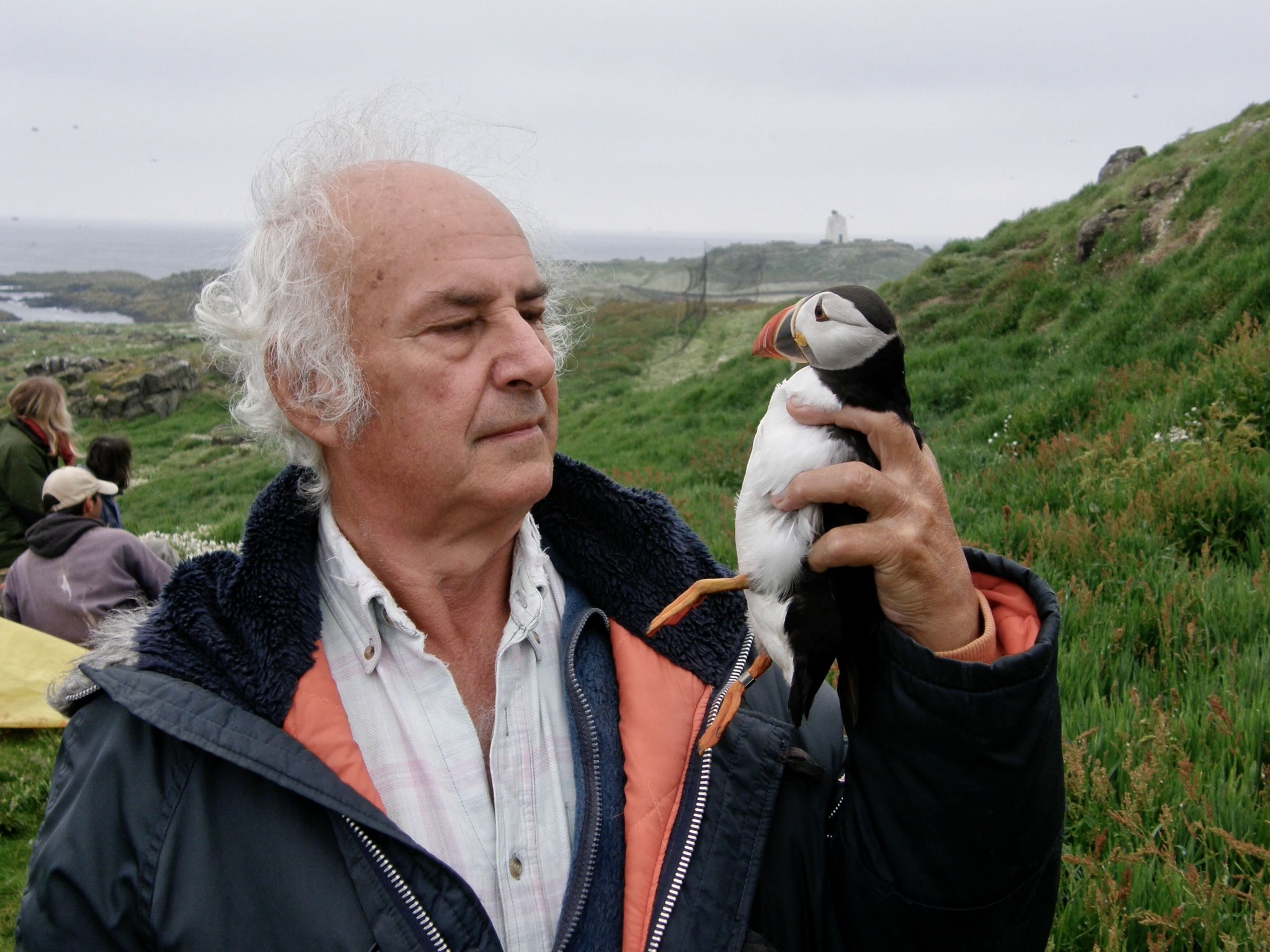
Mike Harris with an Atlantic Puffin on the Isle of May, photograph by Keith Brockie
Well-known and highly regarded marine ornithologist Mike Harris passed away on 17 December after a short illness, at the age of 84. Originally from Wales, where he earned his PhD on gulls, Emeritus Professor Michael Philip Harris was a long-time (since 1972) researcher based at the UK Centre for Ecology & Hydrology in Scotland. He is known for his many studies on a wide range of seabirds, notably the Vulnerable Atlantic Puffin Fratercula arctica, the subject of two books he wrote, the first in 1984, the second in 2011 co-authored with his wife and fellow seabird researcher, Sarah Wanless. Research Gate lists him as having an impressive 328 publications with 15 216 citations. His latest publication, co-authored in the prestigious journal Evolution, was published as recently as October.
During his early career Mike travelled to The Galapagos in the 1960s to undertake ecological research on a wide range of seabirds, notably on two species of storm petrels, but also including on the Waved Albatross Phoebastria irrorata, with several pioneering publications ensuing on this now Critically Endangered species, as listed below.
We went on a field trip together in (I think) December 1976, visiting Langebaan Lagoon and overnighting on Marcus Island in Saldanha Bay on South Africa’s west coast. I was then trying to set up a long-term study colony of African Penguins Spheniscus demersus, and it was good to get Mike’s advice. Sadly, the now Endangered penguin has all but deserted the island, due to a continuing decline in its overall population size, caused primarily by overfishing. His 1974 A Field Guide to the Birds of the Galapagos has long been in my study library. Getting it out now I see he signed it for me “with many thanks for a great time”. Other meetings followed at international seabird conferences over the years.
A previous Scottish colleague of mine at the University of Cape Town’s FitzPatrick Institute of African Ornithology, Mike Fraser, writes of Mike Harris’ passing: “A huge loss to the seabird research fraternity and, in particular, the Isle of May community where he knew every Puffin by its first name! He was certainly well travelled (including, of course, South Africa) and was an outstanding field man. He was a good pal and it’s hard to think he’s gone.”
Mike Harris justly received many accolades during his long career. His citation for the British Ornithologists’ Union Godman-Salvin Medal, awarded to him in 2006 and published in the journal Ibis, is an impressive account of a productive career.
The Agreement on the Conservation of Albatrosses and Petrels extends its sympathies to Sarah, and his family, friends and colleagues. He will be missed.
With thanks to Mike Fraser.
Selected bibliography
Harris, M.P. 1969. Breeding seasons of sea-birds in the Galapagos Islands. Journal of Zoology, London 159: 145–165.
Harris, M.P. 1973. The biology of the Waved albatross Diomedea irrorata of Hood Island, Galapagos. Ibis 115: 483-510.
Harris, M.P. 1979. Survival and ages of first breeding of Galapagos seabirds. Bird-Banding 50: 56-61.
Harris, M.P. & Batchelor, A.L. 1980. Seabird records from the Lindblad Explorer in the South Atlantic, 1976-1978. Marine Ornithology 8: 59-64.
Jiménez-Uzcátegui, G., Harris, M.P., Sevilla, C.R., & Huyvaert, K.P. 2016. Longevity records for the Waved Albatross Phoebastria irrorata. Marine Ornithology 44: 133-134.
John Cooper, Emeritus Information Officer, Agreement on the Conservation of Albatrosses and Petrels, 21 December 2023

 Español
Español  English
English  Français
Français